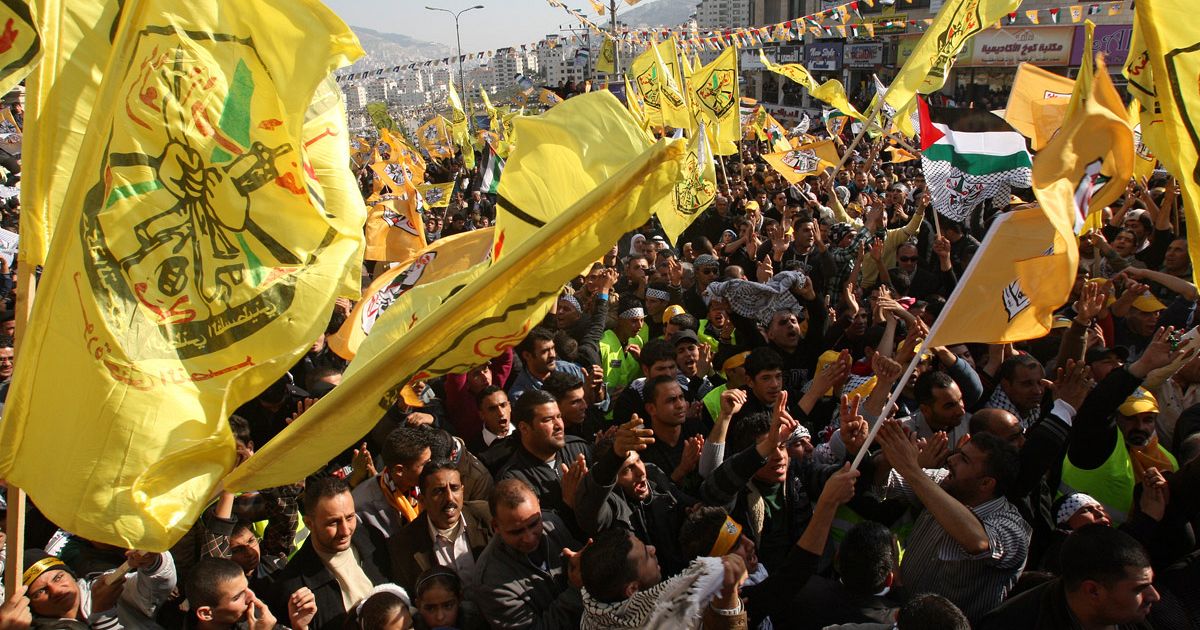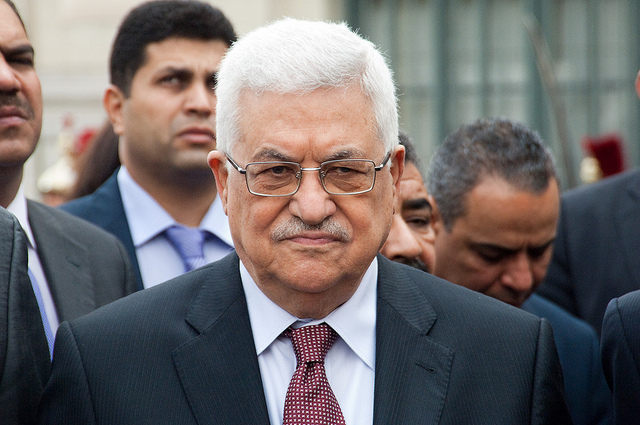Fatah totters into its 7th congress

For the first time, Hamas agreed to Fatah holding its 48th anniversary celebrations in Gaza, January 2013.
Fatah is preparing for its seventh congress to be held in January, which will provide it with an opportunity to clearly spell out its strategy to end Israel’s occupation and reinvigorate the movement with new blood.
By Daoud Kuttab, Al Monitor / Palestine Pulse
December 24, 2014
On Jan. 1, 1965, a military communique was issued in Kuwait announcing the first armed Palestinian operation against Israel stemming from south Lebanon. The cross-border armed operation marked the launch of the Fatah Palestinian National Liberation Movement. As the movement celebrates its golden anniversary next week amid intensive preparations for its seventh congress, its leaders will be considering how to tackle countless challenges.
These internal and external challenges include:
Succession — In its 50 years of work, Fatah has known two main leaders: Yasser Arafat and Mahmoud Abbas. Abbas, at the age of 79, appears to be in good health, but has made it clear that he plans to step down soon. It is unclear whether his public declarations that he has no plans to run for president also include not running for leader of the movement. In the sixth congress held in Bethlehem in August 2009, he won his position by acclamation without competition. The seventh congress might renew confidence in him, but the key votes for the top positions in the 20-member Central Committee and the 100-member Revolutionary Council will signal the personnel and political direction of the movement for years to come.
Policies — The political challenges facing Palestinians after 47 years of occupation and 20 years of failed negotiations will weigh heavily on Fatah as it turns 50. Which direction should it take in terms of the most effective mechanism for liberation? Should it depend more on negotiations, on resistance activities, or a healthy mix of both? Courageous self-criticism will be expected before any votes are cast. Fatah will need to explain and justify its policies, mistakes and failures, and accountability must be practiced. If no one is held accountable for the failures of executing an effective liberation strategy, the prospect of a rejuvenated movement will be slim.
Need for new blood — While the succession issue is crucial and the need to refocus on policy is needed, the most important result in any congress will be how the rank and file of the movement will act when it comes to electing its new leaders. Palestinians living in the occupied territories complain that local leaders are not given a chance at leadership positions despite bearing the brunt of the sacrifice and work. The inside-outside debate will most certainly be reflected in the votes and will go a long way in either revitalizing the movement or weakening it even further.
Role of the diaspora — Palestinians living outside Palestine have a lot of zeal, enthusiasm and money, but have suffered from the same PLO-Islamist divisions that exist in the Gaza Strip and the West Bank. Diaspora Palestinians, who for the most part are refugees or descendants of 1948 refugees, have been dealt major blows by Abbas’ public declarations that he has no intentions of returning to live in his birthplace, Safad, and that Palestinians do not want to flood Israel with Palestinian refugees. While on the record the Palestinian leadership has not given away the right of return, many believe that in fact it has and is only giving lip service to the issue. Without a clear clause unequivocally supporting the right of return, it will be difficult to invigorate Palestinians in the diaspora.

Make tea not war: Mahmoud Ala’deen, who has been arrested for his nonviolent activism, offers tea to Israeli soldiers, May 2012. As the Palestinians knew the soldiers would not accept, the gesture was ironic – meaning ‘you are not welcome’ here says Ryan Rodrick Beiler, photographer.
Nonviolent resistance — The congress will certainly celebrate the sacrifices of its members in recent years, but will give special focus to Ziad Abu Ein, who sacrificed his life while trying to plant olive trees in the face of Jewish settlement expansion. His story will be a powerful example of the need for the entire Palestinian movement to intensify nonviolent popular resistance, especially as it tries to give support to the negotiators and as it reflects a stark difference from the armed actions of Hamas.
Defining a role — The imprisoned Fatah leader Marwan Barghouti has always refused to take any public position in the Palestinian Authority and has always argued that Fatah should not become embroiled with government positions so as to lose its mandate as a national resistance movement. Some Fatah activists told Al-Monitor that this relationship with the government has corrupted the movement amid continued accusations that officials are only interested in the wealth and power that is associated with government positions, rather than focusing on the movement’s goal of liberation. Fatah needs to define a role of supporting governments without being part of them.
Fatah will have a number of other challenges to deal with. The problems with former Fatah leader Mohammed Dahlan and his supporters will certainly leave its mark. Gaza and how to deal with the challenges of rebuilding and reconciliation will also loom large in all sessions of the congress. The delay in joining the International Criminal Court in The Hague will be addressed many times and the absence of an effective communications strategy will be discussed in various forums.
The challenges facing the leading Palestinian national movement are unlikely to be addressed in the two- or three-day congress in Ramallah in January, but a meeting of the movements’ elected delegates from Palestine and around the world will be an opportunity to send clear signals as to the direction the movement will take. A number of Fatah leaders approached by Al-Monitor stressed the need for a self-critical approach to address their challenges in the most effective way.
Fatah’s ruling gerontocracy.
The last general election for the PA legislative council was in 2006; the last presidential election was in 2005, when Mahmoud Abbas was elect3ed for a four-year term.

Above, Fatah spokesman and chief negotiator Azzam Al-Ahmad, middle, Abu Mazen, bottom Central committee member and strategist, Abbas Zaki.

.jpg)
Fatah and the awkward questions
By Nabil Amr, MEMO
December 12, 2014
It seems as though Fatah has plans to hold its annual conference around the middle of next month; if this actually happens, it would be the first time that the organisation has held the event on the scheduled date. The reason is simple: the late-godfather of the movement, Yasser Arafat, did not like public conferences because he feared the surprises that may be sprung therein; he was scared of looking under the stones to see what could be hiding there. Arafat was also concerned that conferences would provide an atmosphere that would encourage Fatah’s members to compete over leadership positions, which could lead to splits within the organisation.
The decision to avoid annual conferences was determined by other factors relating to time and place, in that Fatah often depended on the reality of the political situation at the time and the possibility of further civil disputes or conflict with Israel. Yet, the lack of public occasions such as conferences have led to what can be termed an immortal leadership or oligarchy, because no high-ranking official can be changed without a conference being held at which the membership can discuss the changes in question. Fatah had not held an official conference for over 20 years until it was forced to deal with a changing political reality five years ago. Many complicated questions will undoubtedly be posed during the proposed conference in January and the group will have no choice but to respond to them. Despite Hamas’s ability to advance in polls and at the ballot box, Fatah has managed to maintain its monopoly on the Palestinian national project through two main institutions: the Palestine Liberation Organisation and the Palestinian Authority.
The main question that will be posed in the conference, for which Fatah will not have a response, is this: what will it do when it is forced to reconcile with the failed negotiations? Fatah has placed all of its current bets on this option.
And what will Fatah do when a true sense of Palestinian unity is achieved, especially when the prolonged national division severely weakened its credibility in Palestinian society? Or in the event that the United States blocks its full membership of the UN? Will Fatah see this failure in the same light as it has viewed the negotiations?
What will it do to restore the credibility and legitimacy of its political order and how will it put the Palestinian political house in order?
These are all important and awkward questions which will have to be answered sooner or later. Fatah’s leadership can no longer ignore or avoid answering such questions because the fate of the Palestinian cause and its people are linked to its answers and the policies that will be put in place to address them.
We must remember that Fatah is not a political organisation like any other, and that it is not a party that has gained its power through open and fair competition with its rivals across state institutions. If we don’t, then we will also fail to remember that it is a political movement that gained its reputation and credibility by moving into a void with no rules or controls. It is for this reason that Fatah was responsible for the majority of the initiatives that were sensationalised by the Palestinian people regardless of whether they were launched by Fatah or adopted by Fatah after others launched them. Thus, despite its many setbacks, falls and regressions, Fatah remains responsible for the majority of the national legislature behind Palestinian self-determination.
Fatah’s current state is a direct reflection of the Palestinian situation and if we do not broaden our circles, we can assume that our fate, in both its negative and positive aspects, will be tied directly to the fate of “moderates” in the Arab world because such countries have historically been among Fatah’s greatest allies. What gives Palestine a significant position among these moderates is its direct contact with Israel and it will stay this way until Palestine is no longer the central issue in the Arab reality.
Unfortunately, many people now view Fatah as an irrelevant party that cannot function outside its narrow range. Will the scheduled conference succeed in fixing this impression before the balance is readjusted? This is what must be done if we want Palestinian policies to work in spite of the many and varied agendas surrounding them.
Translated from Asharq Al-Awsat newspaper, 10 December, 2014
